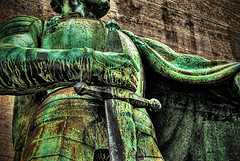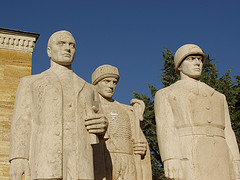Jan 26, 2010 2
Thought Ronin
 I’ve been a “thought ronin” for going on a year now.
I’ve been a “thought ronin” for going on a year now.
In the same way that the lone gunslinger is a staple of the Western, ronin (“masterless samurai”) have been staple figures, and frequently protagonists, in samurai films from the very outset of the genre – an early epic of which was in fact entitled 47 Ronin.
My favorite anime film, Ninja Scroll, is the tale of a ronin, as is the more recent and rather austere The Sword of a Stranger, not to mention Kurosawa classics like Yojimbo and The Seven Samurai, to name but a few examples.
In other words, my sense of what a ronin is comes mainly from the movies (and Hagakure).
[As a total aside, it’s interesting to note that many of the most celebrated samurai films of recent years – such as the work of director Yoji Yamada, maker of the masterful Twilight Samurai – are not about ronin at all but instead about the plight of the low-ranking samurai who often had to ply a trade (e.g., building and selling umbrellas, for instance) to supplement their meager stipend. I read this as an allegory for the plight of the “salaryman” in contemporary Japan – but what do I know about it?]
Anyway, I called myself a “thought ronin” because everybody wants to be a thought leader and I guess I wanted to subtly mock that aspiration (having always been partial to the guru or “cult leader” angle).
On a more serious note, I was stating allegorically that, having served as the retainer of a thought leader and possessing many skills necessary to effective and ongoing thought leadership, I was for “out there.”
Finally, I thought the mass unemployment of “white collar workers,” including members of the intelligentsia such as myself, following on the Global Financial Crisis (is that still happening, btw?) analogous, mutatis mutandis, to the mass unemployment of samurai after the Battle of Sekigahara.
I mean, what did you think a thought ronin was?

